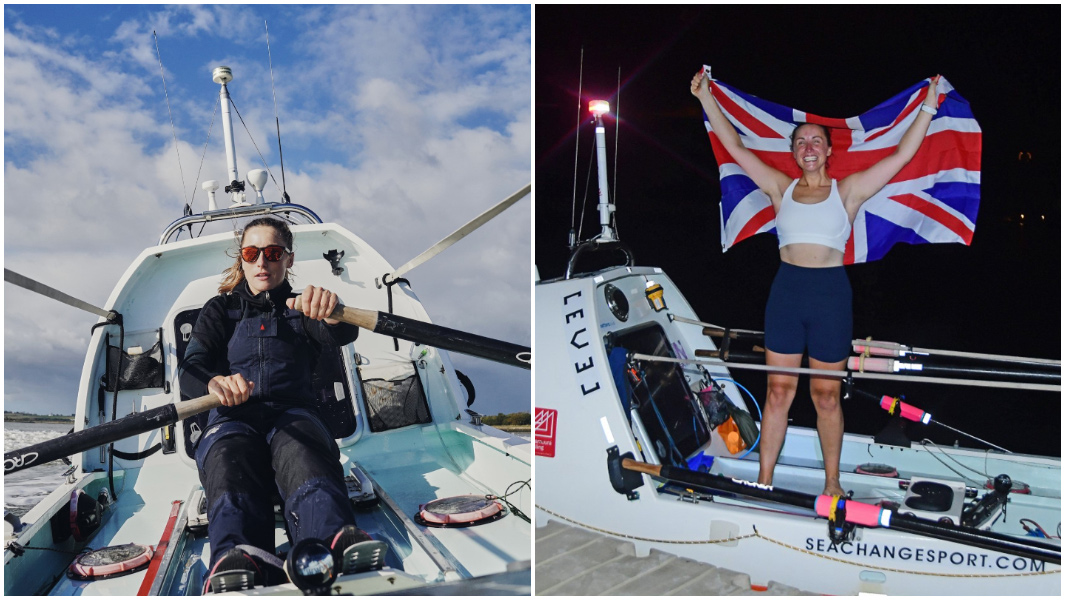Victoria Evans: Epic solo row across the Atlantic breaks record

From 11 February to 24 March 2022, Victoria Evans (UK) made history.
Completely unsupported on a tiny boat in the middle of the ocean, she achieved the fastest female solo row across the Atlantic on the Trade Winds I route (open-class).
The record-breaking journey took 40 days 21 hours and 1 minute, and spanned between Tenerife, Spain and Port St Charles, Barbados.
Victoria attempted this record to help raise £50,000 for Women in Sport, a charity that supports women who want to access sports.

Victoria also wanted to challenge the perception that women's athletic achievements are secondary to the achievements of their male counterparts.
She founded Sea Change Sport and embarked on this record-breaking adventure, crossing the ocean to set an example for women and girls everywhere.
She wanted to prove that, with hard work and resilience, anything is possible.
However, preparing for the quest wasn’t easy.
It took three and a half years and during her training on land and water Victoria worked Biomechanics and Human Performance specialist Chloe Lanthier.
During lockdown, she used a rowing machine at high capacity.
But time on the boat was the best exercise to prepare for this epic undertaking: to succeed, she needed to know how the boat would react to different conditions.

Fully dedicated to her cause, Victoria left her job to train full time and powered through the difficulties of the pandemic.
During the 2,559 nautical miles of this titanic challenge, she could only count on herself and her strength. She had to push herself and her boundaries, crossing a three-mile deep ocean on a tiny, six-metre long boat.
Victoria slept for a maximum of 6 hours and undertook 16-18 hours of rowing every day. Other than the basic necessities, the rest of the time was spent on maintenance for the boat.
She also relied on dried food and no warm meal could be cooked on stormy days.
She had to ration and process all the drinking water she used, all the while facing extreme weather conditions and the constant toll of being under physical and psychological stress.
Her mental preparation proved as important as the physical one, as sleep deprivation caused hallucinations.
Victoria celebrated her 35th birthday on the boat, and broke the record despite the many setbacks and difficulties she encountered.
Completing her feat and docking in Port St Charles, Barbados, Victoria beat the previous record holder, fellow British athlete Kiko Matthews, by eight days.
She also beat her own stretch goal by two days.

"Sport is one of the most powerful vehicles for change," Victoria writes on her website, addressing the issue that many women miss out on sports because the industry is not marketed to them.
"We should be tackling the matter at an industry level; lobbying for changes in policy, culture and quotas to ensure that women’s voices help shape the future of sport, and that opportunities for women in sport vastly increase."
Working as a commercial lawyer, Victoria herself didn’t discover sports until adulthood.

Until her mid-20s, she recalls that she avoided sport completely.
When she was 27 and living in Switzerland she felt empowered to try many different sports, and the discovery revolutionized her life. In the same year, she ran her first half-marathon.
In 2018, she rowed a boat for the first time.

Today, working at a law firm specializing in sport, she is one of the few women who have rowed solo across the ocean.
"This challenge pushed me beyond anything I previously believed capable," she said.
"Gone are the days of the weaker sex, I hope this record demonstrates to all women and girls just what we are capable of." - Victoria Evans



